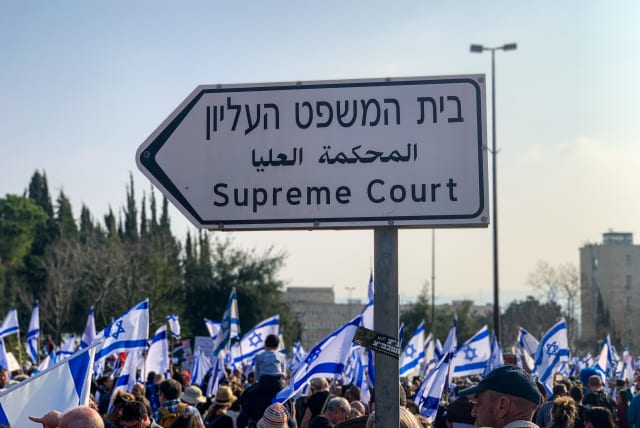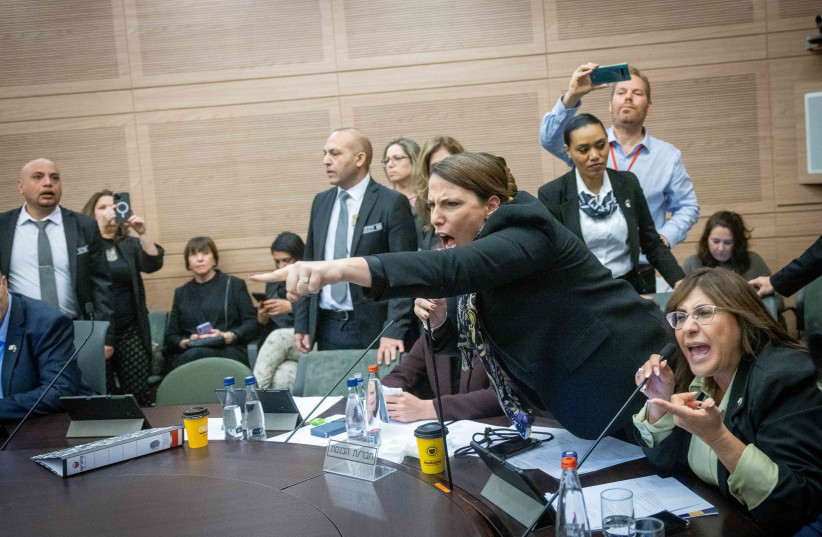Judicial reform: What does the elimination of derived rights mean for Israelis? - explainer

In Israel, certain rights are not explicitly legislated in Israel's quasi-constitutional Basic Laws but are instead derived from them by the court.
Constitution, Law and Justice Committee members expressed concern when committee chairman MK Simcha Rothman explained on Monday that under a new judicial reform bill rights would no longer be able to be derived from Basic Laws for the purpose of judicial review.
The significance of what this development means for the rights of Israelis may require additional explanation.
What does this mean for Israelis?
Dr. Guy Lurie, a Research Fellow at the Israel Democracy Institute, explains that in Israel certain rights such as equality, freedom of speech, freedom of religion, and due process are not legislated in any of Israel's quasi-constitutional Basic Laws.
However, through the Basic Law: Human Dignity and Liberty, the High Court has seen the right of human dignity as a "mother right, which has daughter rights -- or derivative rights -- that are, whether or not recognized in full by the Basic Law, partially included in that right of human dignity."
If equality is infringed, this also is a violation of the core right of human dignity, which protects this right.
Lurie gave as an example the law for exemptions for the Haredi population in military service.
"In that legislation, the court saw it as the infringement in the right of equality," explained Lurie. "Because it infringes also on the right to human dignity as part of its infringement of the right equality, the legislation needs to be examined with the regular test that the court uses, according to the Basic Law immunity, as to whether the infringement is proportional."
The loss of the protection of these derived rights, according to Lurie, would mean that the Knesset can legislate any item that could infringe on the rights of equality or freedom of speech of Israeli citizens.
"The 'shadow' of the Court is also important as it's reflected in proposals that are being made by the government and are set off the table once they understand that there's a potential infringement of these rights," said Lurie. "And now these proposals would potentially go forward and couldn't harm the rights of citizens of Israel."
Israel could be seen as a flawed democracy, as Lurie noted that there was no democratic state constitution in the world without equality as a provision.
The elimination of derived rights would be another way that the High Court would be restricted in its use of judicial review.
Restriction of judicial review
On Tuesday night, the first judicial reform bill passed its first reading in the Knesset plenum, preventing the court from challenging the validity, directly or indirectly, of Basic Laws.
A companion law is currently being debated in the law committee, where Rothman made his remarks regarding derived rights. The draft bill would restrict the High Court's use of judicial review to a full bench of 15 justices in unanimous agreement that a law contradicted a Basic Law -- unanimity being a rare thing among justices. In addition, the bill would introduce the possibility to preemptively immunize a regular law from judicial review, with only a 61-vote majority in the Knesset.
"I think this combination, these stipulations that should be reached in order for the court to do any kind of judicial review amounts to an effective annulment of the power of judicial review of legislation by the court," said Lurie. "There's no real judicial review of legislation once you have all these stipulations in law."
Jerusalem Post Store
`; document.getElementById("linkPremium").innerHTML = cont; var divWithLink = document.getElementById("premium-link"); if (divWithLink !== null && divWithLink !== 'undefined') { divWithLink.style.border = "solid 1px #cb0f3e"; divWithLink.style.textAlign = "center"; divWithLink.style.marginBottom = "15px"; divWithLink.style.marginTop = "15px"; divWithLink.style.width = "100%"; divWithLink.style.backgroundColor = "#122952"; divWithLink.style.color = "#ffffff"; divWithLink.style.lineHeight = "1.5"; } } (function (v, i) { });

